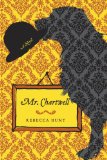Summary | Excerpt | Reviews | Beyond the Book | Read-Alikes | Genres & Themes | Author Bio

 Book Reviewed by:
Book Reviewed by:
Jennifer G Wilder
Buy This Book
This article relates to Mr. Chartwell
Winston Churchill (1874-1965), the famous British prime minister who told Hitler "we shall never surrender" during World War II, was not the first to describe depression as a "black dog." The Oxford English Dictionary cites earlier uses of the phrase in literature and in nursery lore; for example, a sullen child was said to "have the black dog on his back." But Churchill was the most famous, and the expression is now indelibly linked to him.
Most of what we know about Churchill's black dog comes from a memoir his personal physician, Lord Charles Moran, published after his death. "In his early days," Lord Moran writes, "he was afflicted by fits of depression that might last for months. He called them the 'black dog.' He dreaded these bouts and instinctively kept away from anything that seemed to bring them on." Churchill told Moran in 1944, "I don't like standing near the edge of a platform when an express train is passing through...I don't like to stand by the side of a ship and look down into the water. A second's action would end everything. A few drops of desperation."
The image is a powerful one - envisioning depression as a black dog makes it into a physical, externalized presence. And the fact that the black mood is a dog, and not, say, a dragon, means there is the possibility that it can ultimately be brought to heel. In an era when depression was understood less as a clinical illness than as a spiritual failing, the idea that depression could be tamed with discipline must have been appealing. Churchill fought it with all manner of weapons. Even his famous hobby, painting, was a means to gain control.
Rebecca Hunt, the author of Mr. Chartwell, is not the first to find the conjunction between the powerful Churchill and the menacing "black dog" to be a compelling one. The mental-health community in particular seems fascinated by the possibilities inherent in Churchill and his metaphor. It's empowering to think that depression, even in the face of overwhelming obstacles (Hitler, for instance), can be subdued by ornery persistence and the liberal application of stimulants (cigars and whiskey). One British mental-health advocacy group went overboard in the exploration of this concept of "functional mental illness," however. In 2006 the mental-health charity Rethink commissioned a statue of the famous prime minister wearing a straitjacket. It was a fanciful vision - Churchill's "black dog" is more sulky than dangerous. The charity said it had devised the image to promote a new understanding of the face of mental illness, but in fact the sight of Churchill's recognizable jowly visage above a twisted torso restrained in a straitjacket proved to be too alarming to the public and too offensive to Churchill's relations. The statue was taken down.
Interesting Link: The Black Dog Institute: An information and advocacy site about depression, from an Australian mental health institute. Their logo shows Churchill's famous "V" for victory casting a shadow in the shape of a dog's head.
Reference: Lord Charles Moran, Churchill: The Struggle for Survival 1940-1965 as quoted in Anthony Storr, Churchill's Black Dog, Kafka's Mice, and Other Phenomena of the Human Mind (New York, 1965).
Filed under People, Eras & Events
![]() This article relates to Mr. Chartwell.
It first ran in the February 16, 2011
issue of BookBrowse Recommends.
This article relates to Mr. Chartwell.
It first ran in the February 16, 2011
issue of BookBrowse Recommends.





The House on Biscayne Bay
by Chanel Cleeton
As death stalks a gothic mansion in Miami, the lives of two women intertwine as the past and present collide.

The Flower Sisters
by Michelle Collins Anderson
From the new Fannie Flagg of the Ozarks, a richly-woven story of family, forgiveness, and reinvention.

The Funeral Cryer by Wenyan Lu
Debut novelist Wenyan Lu brings us this witty yet profound story about one woman's midlife reawakening in contemporary rural China.
Your guide toexceptional books
BookBrowse seeks out and recommends the best in contemporary fiction and nonfiction—books that not only engage and entertain but also deepen our understanding of ourselves and the world around us.